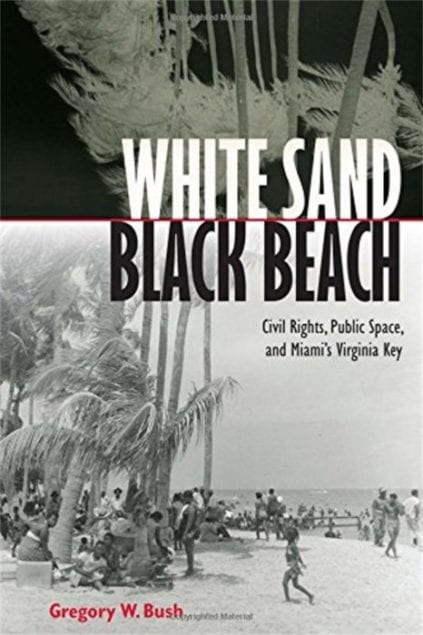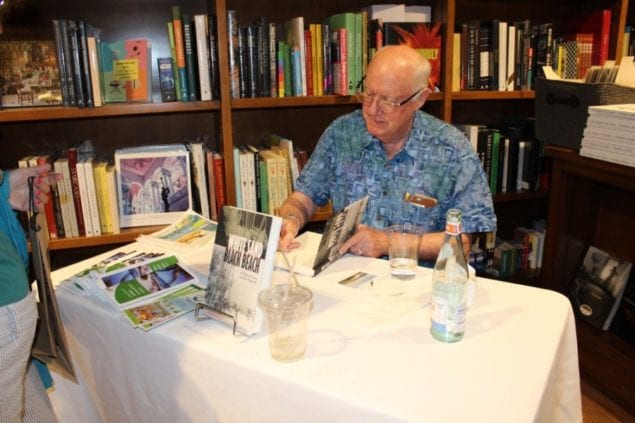Gregory W. Bush, director of the Institute for Public History and an associate professor of history at the University of Miami, launched the release of his new book, White Sand, Black Beach, with a talk and book signing at Books & Books in Coral Gables on Aug. 23.
Despite rainy weather Bush and his topic attracted a standing-room-only crowd for his PowerPoint presentation about Virginia Key and how, in 1945, following the first postwar civil rights demonstration of a wade-in on white beaches, the Dade County Commission finally designated the difficult-to-access Virginia Key as a beach for African Americans.
Bush was quick to point out that his book, extensively researched and powerfully written in great detail, involves much more than just that incident.
“The book is about more than just the park,” Bush said. “It’s about waterfront development, civic activism and where we’re going.”
He explained how at the time there were negotiations between black leaders and white officials going on behind the scenes, and how the very nature of Virginia Key has made it both an object of neglect and a target for developers.
“No one lives there so it does not have a constituency,” Bush said. “But it does have interest groups who care about it.”
In his audience were notables such as historian and preservationist Arva Parks; activist John Van Leer; Nature Link’s John de Olazarra, and Gene Tinnie, chair of the City of Miami Virginia Key Beach Park Trust and a member of Friends of Virginia Key, who thinks highly of the book and its author.
“I think this book is extremely valuable,”Tinnie said. “It’s really a continuation of what Greg’s been doing for years to help the community.
The fact that he is bringing the focus on land and that which belongs to all of us as opposed to all the things that divide us and all the ethnic propaganda, I think that adds to the history in the book. It’s extremely valuable.”
John Van Leer agreed with that view.
“It’s a very interesting book, written by a man who has lived part of the history he’s describing,” Van Leer said. “I’ve been with the Urban Environment League for more than a decade, and on a more peripheral basis with the things that Greg alludes to. I’m with the Citizens Climate Lobby, which is trying to save all of Miami from being underwater, so my perspective is also the future in order to preserve the past.”
Another member of the audience, Blanca Mesa, is active in the community and is concerned about protecting Virginia Key. She likes White Sand, Black Beach.
“It has a lot of history,” Mesa said. “The book is very important in terms of understanding not just the civil rights history, but the history of protecting public spaces. The broader issue, which he alluded to in the talk, is everyone’s right to public space.
“Miami has one of the lowest rates of parks spaces and other public spaces, and right now there’s erosion in what is left. We’ve seen sports stadiums going into what were parks and we’ve seen proposals for more,” Mesa added.
Bush said he is saddened by the “ephemeral fads” that he sees controlling so many decisions. But he said he is more optimistic now than before.
“I question Miami’s ability to sustain any coherent collective memory to create places that last,” Bush said. “Although this is not a book about me, I did become closely involved with many issues surrounding Virginia Key and the struggle for waterfront public spaces since 1996.
“The oral history interviews and panel discussions that I conducted over a number of years helped me to learn much, from Mabel Miller, from former Congressman Dante Fascell, Athalie Range, Enid Pinkney, Lloyd Miller, Dan Paul, Johnny Linton, Merrett Stierheim, Bob Graham and a number of others.”
A man in the audience asked him about today’s race relations.
Bush responded, “I think that ultimately we still live in a very divided city with a lot of pockets of community that only come together during major sports events.”
His view for change, as stated in his book, involves focusing on the public domain and the things that matter, instead of our technological gadgets, news and political business as usual.
“I remain convinced that evolving a new urban ecological ethos requires us to confront and transform the educational-media-entertainment complex that now controls information,” Bush said. “It means challenging the tax structure that allows unlimited writeoffs for advertisements that divide us from one another and from the land.”
White Sand, Black Beach is published by University Press of Florida at $29.95 and is available at Books & Books and other area booksellers.








